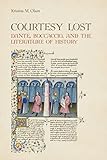Courtesy Lost : Dante, Boccaccio, and the Literature of History / Kristina Marie Olson.
Material type: TextPublisher: Toronto : University of Toronto Press, [2014]Copyright date: ©2014Description: 1 online resource (240 p.)Content type:
TextPublisher: Toronto : University of Toronto Press, [2014]Copyright date: ©2014Description: 1 online resource (240 p.)Content type: - 9781442629264
- 9781442667181
- 858/.109 23
- PQ4293.H5 .O476 2014
- online - DeGruyter
| Item type | Current library | Call number | URL | Status | Notes | Barcode | |
|---|---|---|---|---|---|---|---|
 eBook
eBook
|
Biblioteca "Angelicum" Pont. Univ. S.Tommaso d'Aquino Nuvola online | online - DeGruyter (Browse shelf(Opens below)) | Online access | Not for loan (Accesso limitato) | Accesso per gli utenti autorizzati / Access for authorized users | (dgr)9781442667181 |
Frontmatter -- Contents -- Acknowledgments -- Note on Editions and Translations -- Introduction “Fateci dipignere la Cortesia”: Historicizing cortesia -- 1. Boccaccio’s History of cortesia: The Incivility and Greed of the Elite -- 2. Boccaccio’s Politics of cortesia: Narrating the Elite and the gente nuova -- 3. The Ethical (and Dantean) Framework of the Decameron: The Avarice of Clerics and Merchants -- 4. Constructing a Future for cortesia in the Past: Virility, Nobility, and the History of the Guelphs and the Ghibellines -- Notes -- Bibliography -- Index
restricted access online access with authorization star
http://purl.org/coar/access_right/c_16ec
In Courtesy Lost, Kristina M. Olson analyses the literary impact of the social, political, and economic transformations of the fourteenth century through an exploration of Dante’s literary and political influence on Boccaccio. The book reveals how Boccaccio rewrote the past through the lens of the Commedia, torn between nostalgia for elite families in decline and the need to promote morality and magnanimity within the Florentine Republic.By examining the passages in Boccaccio’s Decameron, De casibus, and Esposizioni in which the author rewrites moments in Florentine and Italian history that had also appeared in Dante’s Commedia, Olson illuminates the ways in which Boccaccio expressed his deep ambivalence towards the political and social changes of his era. She illustrates this through an analysis of Dante’s and Boccaccio’s treatments of the idea of courtesy, or cortesia, in an era when the chivalry of the declining aristocracy was being supplanted by the civility of the rising merchant classes.
Mode of access: Internet via World Wide Web.
In English.
Description based on online resource; title from PDF title page (publisher's Web site, viewed 01. Dez 2023)


